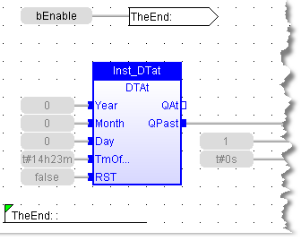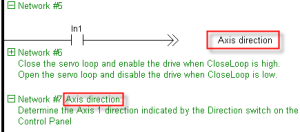LABELS
Remarks
Labels are used as a destination of a jump instruction in FDB, FFLD, or IL![]() "Instruction list"
This is a low-level language and resembles assembly language.
"Instruction list"
This is a low-level language and resembles assembly language.
Labels and jumps cannot be used in structured ST![]() "Structured text"
A high-level language that is block structured and syntactically resembles Pascal language.
"Structured text"
A high-level language that is block structured and syntactically resembles Pascal language.
- A label must be represented by a unique name, followed by a colon :.
- In all languages, it is not mandatory that a label is a target of a jump instruction.
- Use label for marking parts of the programs in order to increase its readability.
- In the FBD
 "Function block diagram"
A function block diagram describes a function between input variables and output variables. A function is described as a set of elementary blocks language:
"Function block diagram"
A function block diagram describes a function between input variables and output variables. A function is described as a set of elementary blocks language:- Labels can be inserted anywhere in the diagram.
- They are connected to nothing.
- In the FFLD language:
- A label must identify a rung.
- It is shown on the left side of the rung.
- In the IL language:
- Labels are destination for JMP, JMPC, JMPCN and JMPNC instructions.
- They must be written before the instruction at the beginning of the line.
- They must index the beginning of a valid IL statement: FFLD (load) instruction, or unconditional instructions such as CAL, JMP or RET.
- The label can also be written alone on a line before the indexed instruction.
FBD Language
In this example, the DTAt block is not called if bEnable is TRUE.
FFLD Language
In this example Network #6 is skipped if IN1 is TRUE.
IL Language
Start: FFLD IN1 (* unused label - just for readability *)
JMPC TheRest (* Jump to "TheRest" if IN1 is TRUE *)
FFLD IN2 (* these two instructions are not executed *)
ST Q2 (* if IN1 is TRUE *)
TheRest: FFLD IN3 (* label used as the jump destination *)
ST Q3
ST Language
Not available.
See Also








